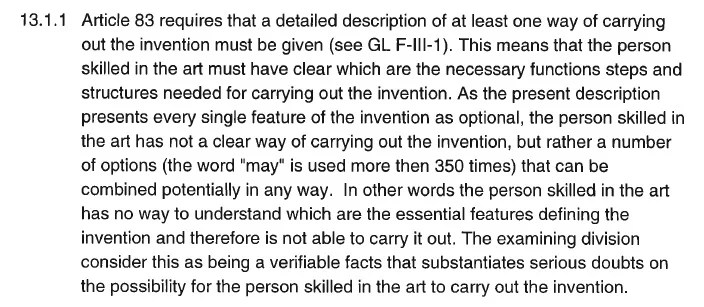In Sonnet 43, Elizabeth Barrett Browning first asks “How do I love thee?” and answers with “Let me count the ways.” This is because of course there are so many ways to love. Today we ask: How does patent prosecution go off the rails? Let us count the ways. This is because, again, there are so many, many ways.
As a first situation, we start with prosecution before the European Patent Office and the issue of intermediate generalizations. According to EP experts, this is where the applicant attempts to narrow a claim by incorporating a feature from the specification, but does so in a way that leaves some part of that feature our. Consider a claim to a boat, where the specification defines the boat as powered by an electric motor coupled with a lithium-ion battery having a liquid cooling system. If the applicant attempts to amend the claim to avoid prior art by specifying only that the boat is powered by a motor and battery (and nothing more), the EPO examiner objects and calls this an intermediate generalization. Namely, the specification only discloses the features of the motor and battery as also having a cooling system, thus, leaving out the cooling system is not allowed (even though the cooling system may be totally irrelevant to avoiding the prior art). Now, the applicant may be stuck adding a feature which is easily avoided (e.g., via an air-based cooling system). While this is just an example, it illustrates how the prosecution can go off the rails for a reason having nothing to do with novelty or inventiveness.
On the flip side, if the applicant attempts to avoid the above before the EPO by utilizing optional language in the specification, the EPO examiner may object for other reasons, such as this example:

Now the applicant cannot even get the case properly examined without resorting to a lengthy and costly appeal.
In the US, an analogous situation is with the BRI (Broadest Reasonable Interpretation). Often examiner make interpretations that are quite unreasonbly broad, and so rather than argue back and forth applicants often simply amend the claims to remove the unreasonably broad interpretation. However, doing so is often not possible by utilizing explicit claim language (since one can never predict just how overly-broad an examiner’s interpretation might be), and so the applicant often must use terms not ipsus verbus from the specification. But of course, then the examiner objects to the amendment as not supported by the specification. Never mind the only reason for the amendment was to eliminate an overly-broad interpretation.
These examples illustrate how things that are on the sidelines to the primary issues of novelty and inventiveness can send things into a spiral. We have many other blog posts on these issues, so read up on how you can minimize some of the above issues by perusing previous posts!

Leave a comment